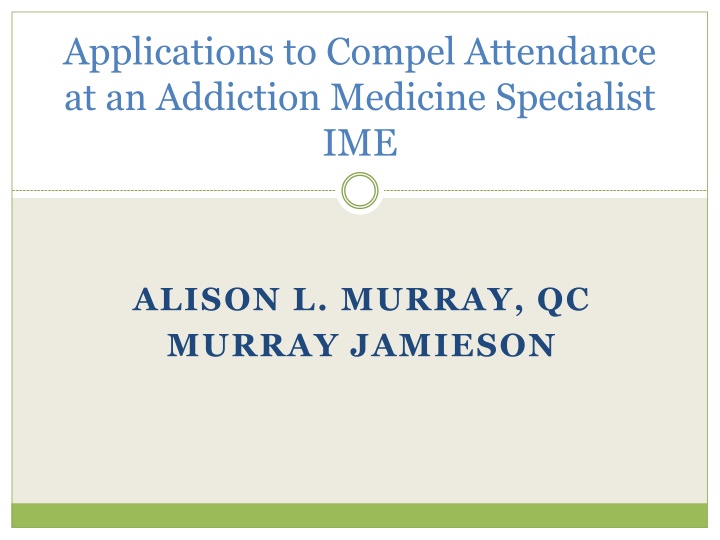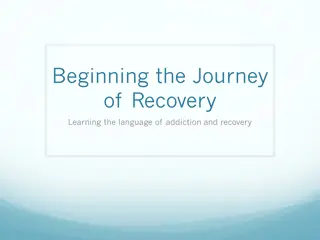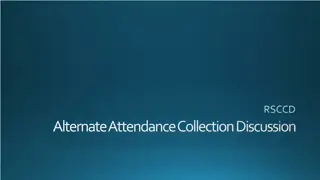Compelling Attendance at Addiction Medicine Specialist IME
Court orders for examination by medical practitioners in cases where physical or mental conditions are in question. Examples of cases where plaintiffs were ordered to provide blood and urine samples due to alleged addiction issues. Instances where addiction issues were discovered through evidence and records, leading to further investigations and orders for drug testing. Proportionality considerations emphasized in addressing serious addiction issues that may impact injuries and damages.
Download Presentation

Please find below an Image/Link to download the presentation.
The content on the website is provided AS IS for your information and personal use only. It may not be sold, licensed, or shared on other websites without obtaining consent from the author.If you encounter any issues during the download, it is possible that the publisher has removed the file from their server.
You are allowed to download the files provided on this website for personal or commercial use, subject to the condition that they are used lawfully. All files are the property of their respective owners.
The content on the website is provided AS IS for your information and personal use only. It may not be sold, licensed, or shared on other websites without obtaining consent from the author.
E N D
Presentation Transcript
Applications to Compel Attendance at an Addiction Medicine Specialist IME ALISON L. MURRAY, QC MURRAY JAMIESON
Rule 7-6(1) (1) If the physical or mental condition of a person is in issue in an action, the court may order that the person submit to examination by a medical practitioner or other qualified person...
Siemens v. Motruk, 2000 BCSC 1593 Plaintiff ordered to provide blood and urine samples. Defendants alleged that the Plaintiff s addiction to medication used to treat pre-existing condition caused or contributed to damages. at least a possibility of addiction to prescribed medication and use of non-prescribed medications. Provision of blood sample is only slightly invasive and is to be balanced against the probative value of the sample. Blood and urine analysis will be the best evidence .
Gordon v. Bill, 2005 BCSC 840 Plaintiff s discovery evidence and pharmanet records disclosed consumption of large doses of opiods before and after the accident. Opinion evidence that the Plaintiff was likely addicted. The test enunciated in Siemens is not a difficult test for the Defendant to meet.
Sahota v. Smithers, unreported, July 19, 2016, Vancouver Registry, S102767 Plaintiff admitted to being dependent on narcotics to manage his pain. Serious credibility issues. Application was opposed on the basis that the issues had already been addressed by a psychiatric IME.
Sahota v. Smithers, continued The addiction issue should be addressed by the specialist with the most complete qualifications. Proportionality relevant because: very serious case addiction issues could possibly have a serious impact on his injuries and damages. A mixed picture as per Stene v. Echols, 2015 BCSC 1063
Sahota v. Smithers, unreported, March 8, 2017, Vancouver Registry, S102767 Plaintiff ordered to attend the offices of a drug testing lab on 18 hours notice from counsel for the Defendants.
Evidence for the Application Discovery transcript; Clinical records; Pharmanet records; Alcohol related charges/convictions; and Credibility issues.
Gawlick v. Lim, 2016 BCSC 526 Any application must be supported by thoughtful affidavit evidence.
Mirzai-Sheshjavani v. Ho, 2016 BCSC 1704 Not a cut and paste affidavit.
Jackson v. Yusishen, 2013 BCSC 1522 The Affidavit should be from the expert and not a legal assistant.
Thandi v. Higuchi, 2015 BCSC 2366 The defence may have to disclose any other IMEs.
Pinette v. Canti, 2003 BCSC 1980 Don t bring the application on the first day of trial.























